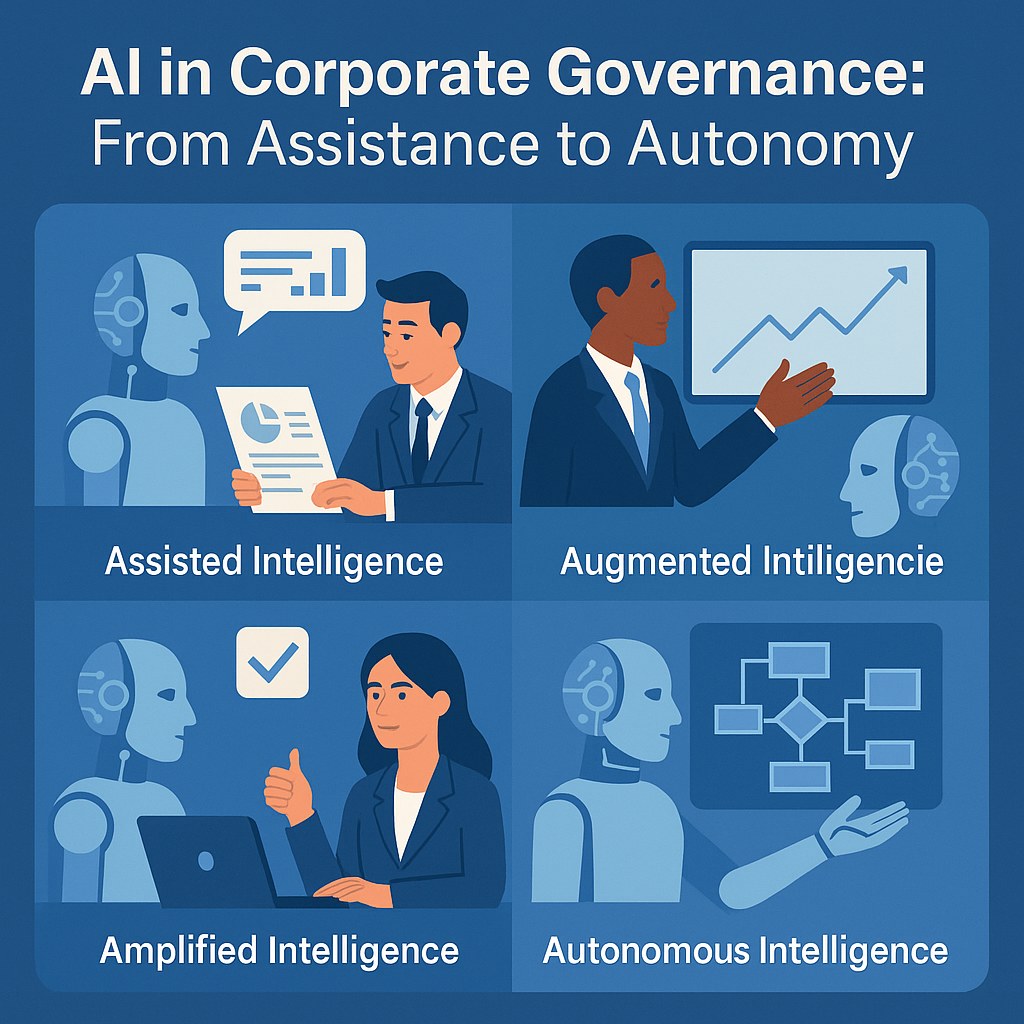Artificial Intelligence (AI) is reshaping how companies operate and make decisions. In the context of corporate governance, its presence has been progressively evolving, altering the role of board members and executives in the strategic direction of organizations.
Based on studies by Hilb (2020), Paschek et al. (2017), Lu et al. (2018), and Starita (2021), we can classify this evolution into four technological stages: assisted, augmented, amplified, and autonomous intelligence.
1. Assisted Intelligence: Enhancing Governance Efficiency
At this stage, AI acts as a provider of operational and market data. Decision-making power remains fully in human hands, but with greater speed and access to relevant information.
✅ AI’s role: data provision and report generation.
✅ Human role: strategic decision-making based on the information provided.
Real-world example:
Goldman Sachs uses AI to automate the collection and analysis of large volumes of financial and market data, allowing board members and executives to make better-informed decisions—without relinquishing strategic control.
2. Augmented Intelligence: More Effective Decisions with AI
Here, AI provides forecasts and simulations, enabling the board or executive team to evaluate multiple scenarios. Decision-making remains a human prerogative, but the foundations of those decisions are shaped by advanced analytics.
✅ AI’s role: predictive models, simulations, risk analysis.
✅ Human role: decision-making supported by analytical insights.
Real-world example:
Unilever uses AI to simulate the impacts of strategic decisions—such as product launches or changes in supply chains—by forecasting their effects on sales, reputation, and sustainability. Final decisions remain in human hands.
3. Amplified Intelligence: Co-Governance Between Humans and Machines
AI begins to take over decision-making in defined areas, following pre-established rules. Humans shift to a supervisory role, setting ethical and regulatory boundaries.
✅ AI’s role: execution of decisions within predefined domains.
✅ Human role: defining scope and managing risks.
Real-world example:
Ant Financial (Alipay) implemented AI algorithms to automatically approve millions of microloans based on user behavior analysis. Human governance defines the risk and compliance thresholds, but individual credit decisions are made by AI.
4. Autonomous Intelligence: AI-Led Governance
At the most advanced stage, AI makes strategic decisions independently, adapting to the environment and learning from complex data. Human intervention may become minimal or even unnecessary.
✅ AI’s role: autonomous, adaptive strategic decisions.
✅ Human role: audit and residual governance (if any).
Real-world example:
DeepMind (a subsidiary of Alphabet/Google) in projects like autonomous energy management in data centers. The system learned how to operate equipment with maximum energy efficiency, outperforming human engineers and making real-time decisions without intervention.
While this case does not yet represent an autonomous board of directors, it illustrates how critical areas can be fully delegated to AI — which, in the near future, may include strategic investment or asset management decisions.
Final Reflections
Each stage represents a shift not only in technology but also in how we understand power, responsibility, and ethics in governance. As AI continues to evolve, boards and executives must learn to govern with AI—or, in some cases, be governed by it.
The pace of this transition will depend on the organization’s digital maturity, industry regulations, and corporate culture. The challenge for leaders will be to ensure that, regardless of the stage, governance remains ethical, transparent, and aligned with the organization’s purpose.
References
- Hilb, M. (2020). New Corporate Governance: Successful Board Management Tools.
- Paschek, D., et al. (2017). Digital Transformation Roadmap in Companies.
- Lu, Y., et al. (2018). Artificial Intelligence and Business Strategy.
- Starita, L. (2021). Artificial Intelligence and Corporate Power.
- Real-world cases: public reports from the companies cited (Goldman Sachs, Unilever, Ant Financial, Google/DeepMind).
Reach a global audience of portfolio, program, and project managers, product leaders, and certification professionals. Explore advertising opportunities .
Sponsored

